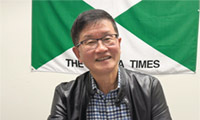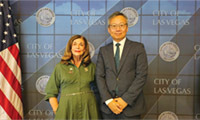Both countries almost take for granted the ties that bind them today: the $600 billion in annual bilateral trade; the 275,000 Chinese studying in America, and the 25,000 Americans studying in China; the fact that China is now America’s largest agricultural market and the largest foreign holder of U.S. debt; and the fact that last year Chinese investment in the United States for the first time exceeded American investment in China.
But dig underneath and you find these two systems increasingly baffled by the other. Chinese officials still have not gotten over their profound shock at how the United States . a country they took as an economic model and the place where many of them learned capitalism . could have become so reckless as to trigger the 2008 global subprime mortgage meltdown, which started the trope in China that America is a superpower in decline.
Chinese officials were also baffled by an effort by President Obama’s team to resist China’s establishment of an Asian Infrastructure Investment Bank, by lobbying our biggest economic allies . South Korea, Australia, France, Germany, Italy and Britain . not to join. While the Treasury secretary, Jack Lew, kept stressing publicly, and responsibly, that the only American concern was that the bank operate by international standards, other Obama officials actively pressed U.S. allies to stay out. Except for Japan, they all snubbed Washington and joined the Chinese-led bank. The whole episode only empowered Beijing hard-liners who argue that the United States just wants to keep China down and can’t really accommodate it as a stakeholder.
Americans, though, are asking of President Xi: “What’s up with you?” Xi’s anti-corruption campaign is clearly aimed at stifling the biggest threat to any one-party system: losing its legitimacy because of rampant corruption. But he also seems to be taking out potential political rivals as well. Xi has assumed more control over the military, economic and political levers of power in China than any leader since Mao. But to what end . to reform or to stay the same?
Xi is “amassing power to maintain the Communist Party’s supremacy,” argued Willy Wo-Lap Lam, author of “Chinese Politics in the Era of Xi Jinping: Renaissance, Reform or Retrogression?” Xi “believes one reason behind the Soviet Union’s collapse is that the party lost control of the army and the economy.” But Xi seems to be more focused on how the Soviet Union collapsed than how America succeeded, and that is not good. His crackdown has not only been on corruption, which is freezing a lot of officials from making any big decisions, but on even the mildest forms of dissent. Foreign textbooks used by universities are being censored, and blogging and searching on China’s main Internet sites have never been more controlled. Don’t even think about using Google there or reading Western newspapers online.
But, at the same time, Xi has begun a huge push for “innovation,” for transforming China’s economy from manufacturing and assembly to more knowledge-intensive work, so this one-child generation will be able to afford to take care of two retiring parents in a country with an inadequate social-safety net.
Alas, crackdowns don’t tend to produce start-ups.
As Antoine van Agtmael, the investor who coined the term “emerging markets,” said to me: China is making it harder to innovate in China precisely when rising labor costs in China and rising innovation in America are spurring more companies to build their next plant in the United States, not China. The combination of cheap energy in America and more flexible, open innovation . where universities and start-ups share brainpower with companies to spin off discoveries; where manufacturers use a new generation of robots and 3-D printers that allow more production to go local; and where new products integrate wirelessly connected sensors with new materials to become smarter, faster than ever . is making America, says van Agtmael, “the next great emerging market.”
“It’s a paradigm shift,” he added. “The last 25 years was all about who could make things cheapest, and the next 25 years will be about who can make things smartest.”
President Xi seems to be betting that China is big enough and smart enough to curb the Internet and political speech just enough to prevent dissent but not enough to choke off innovation. This is the biggest bet in the world today. And if he’s wrong (and color me dubious) we’re all going to feel it.
스마터리빙
more [ 건강]
[ 건강]이제 혈관 건강도 챙기자!
[현대해운]우리 눈에 보이지 않기 때문에 혈관 건강을 챙기는 것은 결코 쉽지 않은데요. 여러분은 혈관 건강을 유지하기 위해 어떤 노력을 하시나요?
 [ 건강]
[ 건강]내 몸이 건강해지는 과일궁합
 [ 라이프]
[ 라이프]벌레야 물럿거라! 천연 해충제 만들기
 [ 건강]
[ 건강]혈압 낮추는데 좋은 식품
[현대해운]혈관 건강은 주로 노화가 진행되면서 지켜야 할 문제라고 인식되어 왔습니다. 최근 생활 패턴과 식생활의 변화로 혈관의 노화 진행이 빨라지고
사람·사람들
more
[인터뷰] 멕시코 오지에 세운 ‘희망 진료소’… “관심과 행동이 등불”
멕시코 바하 캘리포니아의 작은 마을 ‘푼타 코로넷(Punta Colonet)’. LA에서 차로 7~8시간 정도 달려야 닿는 이곳에 한인 내과의…

김영완 총영사 LV 방문
김영완 LA 총영사는 지난 11일부터 13일까지 라스베가스(LV)를 방문, 시장 및 주지사실 산하 경제개발청, UNLV 호텔경영대학 등과 잇따…
어흥축제 국악경연대회 해외 참가자 특별 무대
2025 어흥축제가 우천으로 오는 12월12일로 연기된 가운데 이번 축제의 일환으로 예정됐던 미주 국악경연대회의 해외 참가팀 특별무대 행사가 …
[올림픽 골프] 3개 남가주 매장에서 ‘원스톱 골…
올림픽 골프가 추수감사절을 맞아 대규모 골프 용품 세일을 진행한다. 이번 세일은 골프 클럽, 골프백, 의류, 액세서리 등 다양한 골프 관련 제…
[한스전자] 인기 가전제품 최대 2,000달러 할…
한스전자가 연말을 맞아 삼성, LG, 딤채, 프리지데어 등 인기 가전제품을 대상으로 최대 2,000달러 대규모 할인 행사를 진행한다. 이번 행…
많이 본 기사
- 팽팽한 피부·부푼 입술… “워싱턴 대세 성형스타일은 ‘마가 여성’”
- 관광비자 수수료 인상 185달러서 4… 1
- 의회, ‘엡스타인 파일 공개 법안’ 가결…트럼프 서명만 남아
- 2,000달러 관세 배당금… 내년에 … 1
- 조현병 나아졌다고 방치하면?… 5년 내 80% 재발 가능성 높아
- 데이터센터 건설 열풍 속…미국 겨울철… 1
- 교황, 트럼프 이민정책 거듭 비판… “극도로 멸시적인 대우”
- 검찰 물갈이, 중앙지검장 박철우·반부패 주민철… “안정·쇄신”
- 슬기로운시니어생활 43회
- “화장실에서 꼭 확인해라”… ‘이런 모양’ 변 계속 나온다면 대장암일 수도
- “트럼프 지지율 38%… ‘高물가·엡스타인’에 재집권 후 최저치”
- 트럼프, 공화 장악력 약화… ‘셧다운 핵옵션·엡스타인’ 파열음
- 한인타운 ‘우후죽순’ 노점상들 버몬트… 3
- 의회가 공개 결정한 ‘엡스타인 파일’… 정·재계 새 뇌관 되나
- 채안 캘리포니아 주지사 후보 “시민이… 1
- 한인 대형교회 전도사 113만불 횡령… 10
- “어, 우리 아기 아닌데?” 산후조리원서 신생아 바뀌어 산모 분통
- ‘노재팬’ 나선 中 여행객들, 대신 우르르 한국행
- 한인 버스기사 살해범, 중범 불체자였… 1
- 캐런 배스 시장, 산불 피해 주민 주… 1
- 아내 ‘냉동인간’ 만들더니 돌연 “혼자살기 적적해”…새 여친 맞은 남편 中서 논란
- 형제교회 ‘횡령 사역자’는 성환철 전도사...공동의회 통해 성 전도사 횡령금액과 방법 등 밝혀
- ‘엡스타인 논란’에 입장 돌변 트럼프 “문건 전부 공개하자”
- “연말 항공여행 숨통 튀었다”… 항공편 감축 해제
- 사우디 빈살만 “1조불 투자”…트럼프… 1
- ‘한채영 닮은꼴’ 28기 영숙 “반복되는 오해” 성형 시술 입 열었다
- [김스전기] 알뜰 샤핑의 성지… 풍성한 ‘반값+사은품’ 제공
- 최현우, ‘13억’ 로또 1등 예언 적중에 고소당할 뻔..”당첨금 수령은 노코멘트”[돌싱포맨]
- “워싱턴교협 50년, 다음세대에 방향 제시하는 좌표”
- 하원, ‘엡스타인 파일 공개 법안’ 가결…공화당도 ‘찬성 몰표’
- 갑상선암, 운동과 상관없다더니…10년만에 결과 뒤집혀
- 뉴욕증시, 엔비디아 실적 ‘D-1’ 기술주 또 팔자…동반 하락
- 바이브코딩 넘어 바이브워킹…MS, 모든 업무 통합 에이전트 공개
- [인터뷰] 멕시코 오지에 세운 ‘희망 진료소’… “관심과 행동이 등불”
- 램버트 前 부차관보 “내년 中서 北美회담하려면 러 협조 필요”
- 도요타, 미국 내 하이브리드車 생산 확대… “9억 달러 규모 투자”
- 사자와 생쥐, 그리고 인간 이야기
- 메타, 인스타·왓츠앱 인수 문제삼은 美정부 반독점 소송 승소
- 서예지, 가스라이팅→학폭 논란 후 복귀 준비 중..머리 산발에도 미소
- ‘강제추행 혐의’ 오영수, 대법원 간다..검찰 ‘무죄 판결’에 상고
- 회장선거(뉴저지한인회) 놓고 내분사태… 1
- 대한은 다시 살아나는가 1
- ‘도반(道伴)’
- 연준, 내달 기준금리 0.25%p 내려야”
- LA 라이브 옆 49층 복합타워 신축
- 트럼프 “엡스타인은 민주당 문제…파일공개법 통과시 서명할것”
- ‘쯔양 협박’ 구제역, 수감 중 방송 은퇴 “피해자들에 죄송”
- 우편요금 또 오른다 내년초 최고 7.… 1
- 버핏, 애플 팔고 구글 대규모 ‘베팅’
- 트럼프, ‘7년만의 방미’ 사우디 빈살만에 오·만찬 ‘국빈급예우’
1/5지식톡

-
 테슬라 자동차 시트커버 장착
0
테슬라 자동차 시트커버 장착
0테슬라 시트커버, 사놓고 아직 못 씌우셨죠?장착이 생각보다 쉽지 않습니다.20년 경력 전문가에게 맡기세요 — 깔끔하고 딱 맞게 장착해드립니다!장착비용:앞좌석: $40뒷좌석: $60앞·뒷좌석 …
-
 식당용 부탄가스
0
식당용 부탄가스
0식당용 부탄가스 홀세일 합니다 로스앤젤레스 다운타운 픽업 가능 안녕 하세요?강아지 & 고양이 모든 애완동물 / 반려동물 식품 & 모든 애완동물/반려동물 관련 제품들 전문적으로 홀세일/취급하는 회사 입니다 100% …
-
 ACSL 국제 컴퓨터 과학 대회, …
0
ACSL 국제 컴퓨터 과학 대회, …
0웹사이트 : www.eduspot.co.kr 카카오톡 상담하기 : https://pf.kakao.com/_BEQWxb블로그 : https://blog.naver.com/eduspotmain안녕하세요, 에듀스팟입니다…
-
 바디프렌드 안마의자 창고 리퍼브 세…
0
바디프렌드 안마의자 창고 리퍼브 세…
0거의 새제품급 리퍼브 안마의자 대방출 한다고 합니다!8월 23일(토)…24일(일) 단 이틀!특가 판매가Famille: $500 ~ $1,000Falcon: $1,500 ~ $2,500픽업 & 배송직접 픽업 가능LA…
-
 바디프렌드 안마의자 창고 리퍼브 세…
0
바디프렌드 안마의자 창고 리퍼브 세…
0거의 새제품급 리퍼브 안마의자 대방출 한다고 합니다!8월 23일(토)…24일(일) 단 이틀!특가 판매가Famille: $500 ~ $1,000Falcon: $1,500 ~ $2,500픽업 & 배송직접 픽업 가능LA…
케이타운 1번가
오피니언
 노세희 부국장대우·사회부장
노세희 부국장대우·사회부장 대한은 다시 살아나는가
 민경훈 논설위원
민경훈 논설위원사자와 생쥐, 그리고 인간 이야기
 한형석 사회부 부장대우
한형석 사회부 부장대우 한인타운 교통 인프라 개선 기대
 박영실 시인·수필가
박영실 시인·수필가 [화요칼럼] 말의 위력
 양홍주 / 한국일보 논설위원
양홍주 / 한국일보 논설위원 [지평선] 외국어 공부와 장수
 이상국
이상국 ‘도반(道伴)’
 옥세철 논설위원
옥세철 논설위원러시아제국 부활의 꿈은 멀어져만 가고…

폭발 직전의 상황인가?
 메건 매카들 워싱턴포스트 칼럼니스트 / CNN ‘GPS’ 호스트
메건 매카들 워싱턴포스트 칼럼니스트 / CNN ‘GPS’ 호스트 [메건 매카들 칼럼] 지나간 시대의 낙관주의
1/3지사별 뉴스

‘네이버 플러스’호스피스 자원봉사자 31명 배출
뉴저지 팰리세이즈팍에 위치한 비영리단체‘네이버 플러스’(Neighbor Plus·이사장 양춘길 목사)가 말기암 환자와 그 가족들을 돌보는 제4…
회장선거(뉴저지한인회) 놓고 내분사태 ‘악화일로’

“워싱턴교협 50년, 다음세대에 방향 제시하는 좌표”
“구슬이 서 말이라도 꿰어야 보배라는 말이 있다. 구슬을 꿰어 보배를 만들어 낸 편찬위원회에 감사하고, 지난 50년간 그 구슬을 만들어낸 여러…
장학생 20명 선정…장학금 총 3만불

사우디 빈살만 “1조달러 투자”…7년만의 방미환대 트럼프에 선물
사우디아라비아가 18일 대미 투자액을 기존에 발표했던 6천억 달러(약 876조원)에서 1조 달러(약 1천460조원) 규모로 상향 조정하기로 했…
방한후 美입국했다 석연찮게 구금된 한인과학자, 4개월만에 석방

오늘 하루 이 창 열지 않음 닫기 


















































.png)


댓글 안에 당신의 성숙함도 담아 주세요.
'오늘의 한마디'는 기사에 대하여 자신의 생각을 말하고 남의 생각을 들으며 서로 다양한 의견을 나누는 공간입니다. 그러나 간혹 불건전한 내용을 올리시는 분들이 계셔서 건전한 인터넷문화 정착을 위해 아래와 같은 운영원칙을 적용합니다.
자체 모니터링을 통해 아래에 해당하는 내용이 포함된 댓글이 발견되면 예고없이 삭제 조치를 하겠습니다.
불건전한 댓글을 올리거나, 이름에 비속어 및 상대방의 불쾌감을 주는 단어를 사용, 유명인 또는 특정 일반인을 사칭하는 경우 이용에 대한 차단 제재를 받을 수 있습니다. 차단될 경우, 일주일간 댓글을 달수 없게 됩니다.
명예훼손, 개인정보 유출, 욕설 등 법률에 위반되는 댓글은 관계 법령에 의거 민형사상 처벌을 받을 수 있으니 이용에 주의를 부탁드립니다.
Close
x